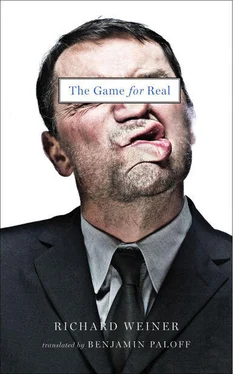“God willing!” she said, and she leaned sculpturally on her chin. “But I have always loved! I loved him . I loved Mutig. Don’t you know that love is a dead end? And one that always leads to glory? No matter where it leads? Why did you hold me back? Why did you, in all your curiosity, ever hand me over to Fuld? Oh, because I was on the street and Fuld wanted me, I know. Those guys were as sharp as cactus needles and as bitter as wormwood. They abused and they tortured. But their scorn had edges and limits. I like things that your eyes can move along. They tormented and humiliated, but it was out of an earthy taste. But Fuld has a double face,” she continued in a trusting whisper. “You know? A double face. Whether he was making an offer or speaking ill, everything that came out of him was the same slime. He’s a glutton for problems. He has coarse tastes. He sets people on divine paths — you know why?” (And in a timid whisper:) “For the spectacle of vice and misfortune. What would he do with people who’d found their path themselves?” She turned toward me slowly, and, giving me a compassionate wink:
“You’ve been seeking each other a long time. You belong together. You’re no good at taking things either, taking people, of weighing them and telling them hopelessly: ‘You’re following your own path.’ You, in your pity, you don’t know, either, that the main thing is to follow your own path. And there’s nothing that can be done about it.” She shrieked hatefully, “You only force them into detours. What you’re running is purely a game!
“Fuld? He doesn’t trust anything that’s simple and positive, just because it’s not confused and negative. Love, virtue, truth? It’s not like he didn’t believe in them, you know? But he’s no good at dressing people in them. No one, no one in the world. He’s a person so dissolutely suspicious that he thinks everything is dissolute if it’s not perfect. Miserable people, miserable people, don’t you know that there’s no way for us to tempt the saints too much? You’re worse and more intolerant than God. Maybe the devil will hold up against you; you’d bring an angel to ruin.
“Let me go, put me out to those pastures,” she said suddenly, with bracing heartiness, “come on, hurry up, don’t you hear me?” And she assumed the position of a kitschy allegory of Echo, winking at me that she knows what she’s doing and how it looks.
And again that three-note motif, which this time I recognized immediately, and which, before blossoming, drew itself out, separating us. But when she was already quite far away, as though behind numerous veils, but always curiously visible, that taut motif suddenly slackened, brightened up, and began to spin off into the helix of a tango, toward which the rondo theme from Eine kleine Nachtmusik ascended like a tendril. And Giggles, her finger on her lips, smiled, and then she declaimed, “The rondo of cheerful lads, the rondo of luminous thieves who rob people who’ve formed from the shadows, so as to serve that beautiful justice, according to which one must take from the poor even what little they have, that it might then be handed over to the rich.
“Do you hear?” she added from far off. “Do you see? Do you remember?”
And I understood that she meant that bar I’d dropped in on several days before. That tango was playing. There was dancing. Mutig danced, too. Quite openly, and with the tilted head of someone calculating distance.
But what Mutig was calculating was the span of time that had been granted to his dance partner. She knew it; why else would she press herself to him so urgently, pointlessly? The tango crept up behind Mutig like a lasso primed for action, but each time it was flung toward him on a heavily stressed beat Mutig’s evil flared up and burned it away. He glittered with guileless cruelty — it suited him like dignity. It was on that day that the words were born on his lips: “You think it’s fun being a god?” They would soon ripen anew, and Mutig, weeping, would revive himself on them, on them and the devastation of today’s dance partner, whose dovish crime grows and grows. May she be more fortunate than Giggles, may she not meet her savior.
Giggles entered the bar and made straight for the bartender: “Have you seen Dédé? He didn’t leave me a message? Dédé?” — The bartender slowly set aside his shaker, folded his arms in a sober and lordly manner, and said with a courtesy behind which skulked a pink slip: “Giggles, you don’t work today. You have the best days: Saturdays and Thursdays. Don’t you think you should scram? Dédé! Of course Dédé was here. But he’s a guest, and you belong to the house: on Thursday and Saturday. Today’s Wednesday.”
Giggles walked away obligingly. — Mutig danced past her. “Hello there, Giggles,” he called. She lowered her eyes, squinting them as though from light, and slipped past like a shadow. — Later, Mutig told me, “You see, I don’t harbor unfriendly feelings toward her. But she died out in such a way that even her suffering brought her shame. If she at least despised me, if she at least couldn’t despise me, but no: she doesn’t dare despise me.”
“Do you see, do you see what you’ve accomplished?”— I could hear it from far away, but such that even if Giggles had already disappeared, I had no doubt as to the smile with which she spoke. Literally as if I was seeing it, that smile of the propitiatory sacrifice: it crossed her lips like a late-arriving guest, without whom things can’t get started, the same smile with which, on Rue Lamarck, she had passed that long needle to me across the table.
And this scene arose before me in such hallucinatory earnestness that I unwittingly called out, “Again, Giggles? Why? Haven’t I already killed you?”
“Yes, but poorly,” I heard, but with such inappropriately sparkling laughter I couldn’t stand it and bolted in her direction on the off chance of catching up with Giggles, for I was beginning to suspect that she had withheld something significant from me, that she’d deceived me. So I ran out — oddly, I don’t remember opening any doors as I was running out — and ended up on a long, straight street, which I ran down with a speed that I myself remarked as the insistence with which that street urged me to err, casting around for why, to such an extent, nothing here rings a bell. Then I oriented myself better; I was running through the same place I’d recently driven through in the cab with Fuld and Giggles, everything was again as it was then, only somehow more cursory. Thus I ran as far as the theatrical Saint-Cloud, this time for the most part abandoned, and sped through that aquatic landscape, relishing how skillfully I plotted my path through those narrow, grassy balks between the waters, for I sought the shortest way: the one toward that bend in the road that had so enticed me the first time, and that now seemed to me a truly imperative goal. When the bend again revealed itself to me on the horizon, I felt at the same time the surfacing of the thought that I had not, in fact, ascertained whether I might have already gotten my face back, it unsettled me a bit that this thought had arisen swiftly upon my spotting that damned bend in the road, but I drove this unsettlement away again relatively easily. I felt around my face, or around where by right and justice it should have been; touch ascertained nothing unusual, but I recalled that back when my face had expired, touch had betrayed nothing then, either, it had been some other sense of the hand that had pulled the alarm, a sense that in no way registered now. So I said to myself: “According to touch, everything’s back to normal. But what does that prove?” — All the more did I put on speed, and I wasn’t the least bit amazed when, having run up to the bend, I ascertained that that’s where Paris began, and that’s just the beginning of Rue d’Astorg; that is, the street where Fuld lived (it occurred to me that I hadn’t seen him in several months). Paris begins at Rue d’Astorg, which begins again at Fuld’s building, which is otherwise halfway down the street. This didn’t confuse me, and actually, as I started running to the steps, I recognized it instantly, and thus I recognized that I’d come to the right place. My ring was answered by a swift “who’s there,” and when I said my name it was answered, swiftly again, with “that’ll do, come in,” and they opened for me. I should actually write that “the women” opened for me, since it was mostly women in the apartment, in thick black veils, and it seemed to me that there were far more of them than an altogether small apartment could reasonably accommodate. Altogether small, I say, and still it was a long time before I’d run as far as Fuld’s room; I’d almost say farther than from my place to here, and one of the women, in whom I recognized Fuld’s sister, escorted me along a line of the rest, speeding along with me.
Читать дальше












